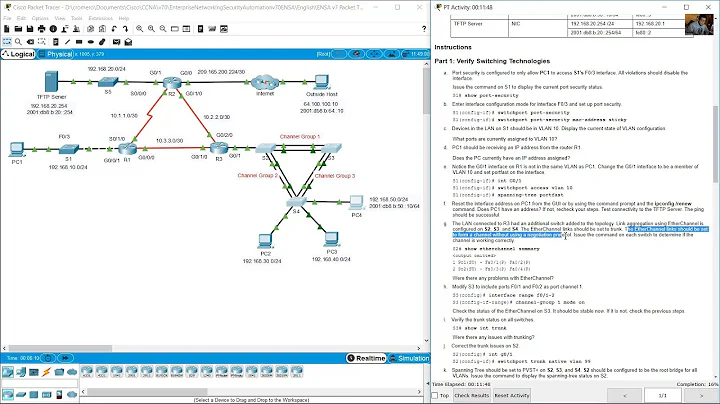find: ‘ls’ terminated by signal 13 error
First of all, based on your previous question, you want -mtime +7 for 7 days or older. -mtime -7 means 7 days old or newer.
The ambiguous redirect error probably means that $log is not defined. I cannot reproduce your find: ‘ls’ terminated by signal 13 it probably depends on the specific files you have in the folder in question. Could you post the file list somewhere?
Anyway, signal 13 means a broken pipe so something is going wrong. Are you piping this command through head or tail or similar? Try this and see if you get the same errors:
find $HOME/OldLogFiles/ -type f -mtime +7 -exec stat -c "%n %y" "{}" \; -exec echo was deleted on `date` \; |paste - - >>$log
Related videos on Youtube
Comments
-
 mkrouse over 1 year
mkrouse over 1 yearMy Script
log=$HOME/Deleted/$(date) find $HOME/OldLogFiles/ -type f -mtime -7 -exec ls -latr {} \; -exec echo was deleted on `date` \; -exec rm -f "{}" \;|paste - - >> $logMy goal for the script is to delete files older than x amount of days and then log them to a file and display the filename, date deleted, and how old it was. I keep getting these errors however...
./test.sh: line 3: $log: ambiguous redirect find: ‘ls’ terminated by signal 13 find: ‘ls’ terminated by signal 13Anybody have any suggestions?
-
 Andrew Lott almost 11 yearsCan you clarify exactly what you're trying to achieve here? It will help anybody trying to answer your question as well as anybody searching for similar questions.
Andrew Lott almost 11 yearsCan you clarify exactly what you're trying to achieve here? It will help anybody trying to answer your question as well as anybody searching for similar questions. -
 mkrouse almost 11 yearsSure I updated it for you.
mkrouse almost 11 yearsSure I updated it for you. -
 mpy almost 11 yearsDownvote, because this is a follow-up to superuser.com/q/612930/195224
mpy almost 11 yearsDownvote, because this is a follow-up to superuser.com/q/612930/195224 -
 terdon almost 11 years@mpy so? What if it is a follow up? Nothing wrong with that, the OP very correctly posted a new question rather than cluttering the comments of their previous question. That is exactly what they should do. There is no reason to downvote, it is a perfectly clear question.
terdon almost 11 years@mpy so? What if it is a follow up? Nothing wrong with that, the OP very correctly posted a new question rather than cluttering the comments of their previous question. That is exactly what they should do. There is no reason to downvote, it is a perfectly clear question. -
 mkrouse almost 11 years@terdon Thanks for sticking up for the little guy! :)
mkrouse almost 11 years@terdon Thanks for sticking up for the little guy! :) -
 terdon almost 11 yearsYou're welcome. Just so you know, @mpy is only trying to be a good SU user, I am sure he has nothing against you personally and I have nothing but respect for the quality of his answers. We just disagree on this particular point.
terdon almost 11 yearsYou're welcome. Just so you know, @mpy is only trying to be a good SU user, I am sure he has nothing against you personally and I have nothing but respect for the quality of his answers. We just disagree on this particular point. -
 Scott - Слава Україні almost 11 yearsThe
Scott - Слава Україні almost 11 yearsThe-aoption oflsis meaningless when applied to file argument(s). (ls –l .bashrcworks fine; you don’t need to sayls –la.) And the-tand-roptions are meaningful only when you have multiple arguments, or one (or more) directory argument. So, since you’re saying-type f, you might as well say just-exec ls -l {}.
-
-
 mpy almost 11 years
mpy almost 11 yearsambiguous redirectioncan also be caused by white spaces in$log; try this in bash:log=$(date); echo foo > $log, this failes, whilelog=$(date); echo foo > "$log"is working fine. -
 Scott - Слава Україні almost 11 yearsWell, putting the pieces together here: if there’s something about
Scott - Слава Україні almost 11 yearsWell, putting the pieces together here: if there’s something about$log(such as unescaped, unquoted embedded spaces) that makes>> $logfail, then that means that thepasteprocess never gets started, and so thefindis piping into nothing. Butfindisn’t writing to its standard output; it’s only spawning child processes (lsandecho) that do. (rmalso shares the same stdout; i.e., the broken pipe, but it doesn’t write anything to it.) So, each timefindfork/execslsandlswrites, it gets a broken pipe signal. -
 Scott - Слава Україні almost 11 yearsThe only question is: Why doesn’t
Scott - Слава Україні almost 11 yearsThe only question is: Why doesn’techoexhibit the same behavior? I guess it probably has something to do with the fact thatechois a shell builtin command.

![#AAT13 [CN] Khắc phục lỗi Specified access point not found S7-200](https://i.ytimg.com/vi/yRYyd-dHAQQ/hq720.jpg?sqp=-oaymwEcCNAFEJQDSFXyq4qpAw4IARUAAIhCGAFwAcABBg==&rs=AOn4CLC_BptB7i8l__ZhQPb1ptJQrhTlJg)


